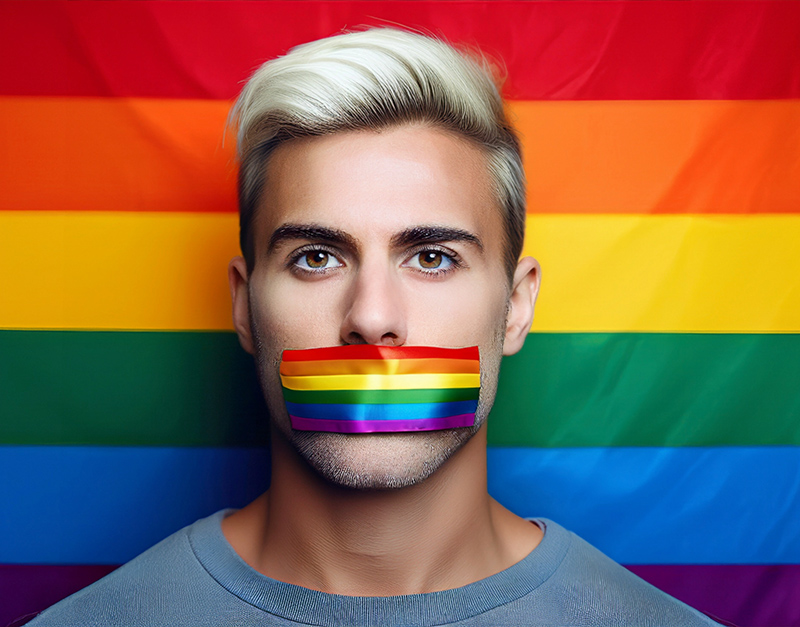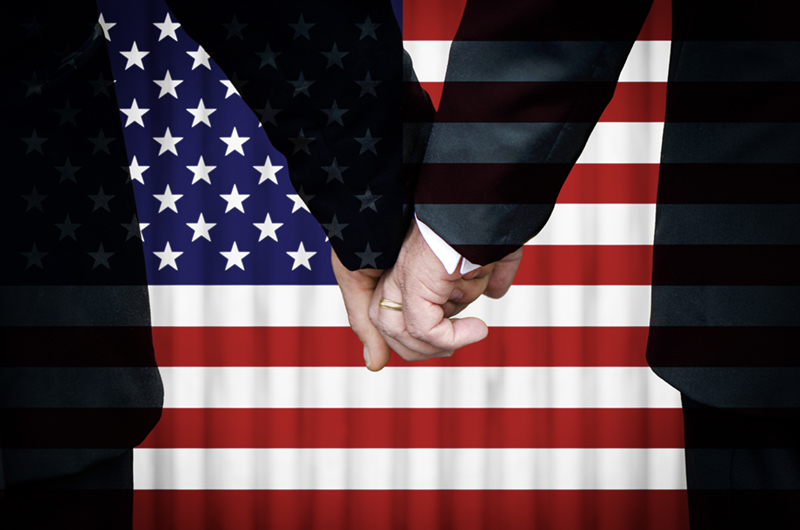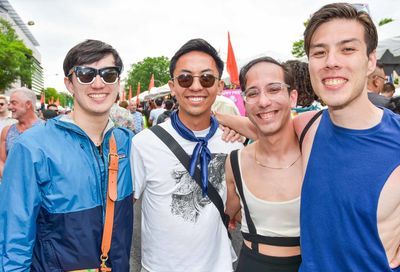FBI report shows number of anti-LGBTQ hate crimes in U.S. rose in 2018
Anti-LGBTQ hate crimes increased in 2018, with crimes based on gender identity rising 41% over the previous year

A new report from the FBI finds that hate crimes targeting Latinos and LGBTQ people, particularly transgender individuals, increased in 2018, despite a slight overall dip in the number of hate crimes.
In total, using data submitted by more than 2,000 police departments nationwide, the FBI counted 7,120 crimes motivated by bias — 55 fewer than were reported in 2017, constituting a decline of less than 1%.
While the decrease, however slight, marks the first time the number of reported hate crimes has gone down in four years, the number of bias-motivated crimes has been trending upward over the past decade, after dropping precipitously from a high of 7,783 incidents in 2008 to 6,604 in 2009.
“The numbers, on the surface, seem to remain relatively flat overall,” Brian Levin, the director of the Center for the Study of Hate and Extremism at Cal State San Bernardino, told the Los Angeles Times. “But underneath the data there are some interesting trends happening.
“There has been a disturbing shift to hate crimes directed against people as opposed to property and these increases are seen almost across the board,” Levin added.
According to the FBI, crimes against people grew to 4,571 last year, an increase of 12% over 2017.
While bias crimes based on race or ethnicity and religion decreased from last year, the number of anti-Latino crimes increased to 485, a 14% increase from 2017.
Crimes against the LGBTQ community also increased from 2017 to 2018, with those motivated by sexual orientation rising from 1,130 to 1,196, and crimes motivated by gender identity increasing by 41%, from 119 to 168.
Locally, in D.C., the number of hate crimes rose 10% over 2017 levels, although hate crimes motivated by race and ethnicity decreased by 8%, and the number motivated by religion decreased by 14%.
The most obvious increases were in crimes targeting people or property based on sexual orientation, which rose by 19%, and crimes targeting gender identity, which rose from 13 incidents to 33 incidents — a yearly increase of 153%.
The Human Rights Campaign issued a statement sounding the alarm about what it calls “unacceptably high levels of hate crimes.”
“Bias-motivated crimes are a real, frightening problem in the United States, and LGBTQ people continue to be targeted because of who they are,” HRC President Alphonso David said in a statement. “In 2018, we know that at least 28 transgender people were violently killed. So far in 2019, 22 transgender or gender non-conforming individuals have been killed. These numbers represent real people — people with friends, families and lives.
“The epidemic of violence against LGBTQ people and specifically against transgender women of color is staggering, and it is something we must address head-on,” he continued. “For that to happen, we need mandatory hate crimes reporting across the country, better training for law enforcement officers to recognize bias-motivated crime and greater inclusion and equity in our communities. This data is harrowing, but it is also helpful in understanding just how much work we all have to do, together.”
HRC also noted that LGBTQ people are not alone in being targeted. Racially-motivated crime remains the most common type of hate crime, with half of all racially-based bias crimes targeting black people.
While hate crimes against Jewish and Muslim people decreased from 2017, both communities are the two religious groups most likely to be targeted by hate crimes — despite frequent and vocal claims by some American Christians of widespread persecution.
This is particularly true for Jewish people, who are the targets in nearly 3 out of every 5 religiously-motivated bias crimes.
Because reporting hate crimes to the FBI is not mandatory, many anti-hate activists warn that the statistics contained in the most recent report may only represent a fraction of bias-motivated crimes.
Notably, the number of law enforcement agencies reporting hate crimes data decreased by 110 from 2017 to 2018, with at least 85 cities with populations exceeding 100,000 either reporting zero hate crimes — or, more likely, not reporting any hate crime data to the FBI.
Such numbers lead people to be skeptical, especially when the states of Alabama and Wyoming — containing an estimated 5.5 million people — reported zero hate crimes of any type for all of 2018.
The LGBTQ media advocacy organization GLAAD cast blame on the growing acceptance of hateful and divisive rhetoric in the country as contributing to the rise in bias crimes, specifically focusing on the rhetoric of President Trump, and the actions taken by his administration that activists allege target vulnerable groups for discrimination.
“As our culture grows more and more divisive, fueled largely by an anti-LGBTQ White House, a permission slip has been given for some Americans to act on their worst instincts and to target others,” GLAAD President and CEO Sarah Kate Ellis said in a statement. “This report should sound an alarm that we all must do better to create a country where marginalize communities are safe and protected against hate violence. Violent hate crimes against LGBTQ people are a pervasive issue that needs to be addressed by politicians and law enforcement in a bipartisan and urgent way.”
Read more:
Pete Buttigieg leads new Iowa poll, joins Warren, Biden and Sanders in top tier
Support Metro Weekly’s Journalism
These are challenging times for news organizations. And yet it’s crucial we stay active and provide vital resources and information to both our local readers and the world. So won’t you please take a moment and consider supporting Metro Weekly with a membership? For as little as $5 a month, you can help ensure Metro Weekly magazine and MetroWeekly.com remain free, viable resources as we provide the best, most diverse, culturally-resonant LGBTQ coverage in both the D.C. region and around the world. Memberships come with exclusive perks and discounts, your own personal digital delivery of each week’s magazine (and an archive), access to our Member's Lounge when it launches this fall, and exclusive members-only items like Metro Weekly Membership Mugs and Tote Bags! Check out all our membership levels here and please join us today!





























You must be logged in to post a comment.